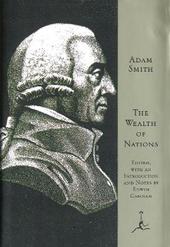
|
The Wealth of Nations
Hardback
Main Details
| Title |
The Wealth of Nations
|
| Authors and Contributors |
By (author) Adam Smith
|
|
Edited by Edwin Cannan
|
| Physical Properties |
| Format:Hardback | | Pages:1200 | | Dimensions(mm): Height 211,Width 147 |
|
| Category/Genre | Economic theory and philosophy |
|---|
| ISBN/Barcode |
9780679424734
|
| Classifications | Dewey:330.153 |
|---|
| Audience | |
|---|
|
Publishing Details |
| Publisher |
Random House USA Inc
|
| Imprint |
Modern Library Inc
|
| Publication Date |
25 January 1994 |
| Publication Country |
United States
|
Description
First published in 1776, The Wealth of Nations is generally regarded as the foundation of contemporary economic thought. Adam Smith, a Scottish professor of moral philosophy, expounded the then-revolutionary doctrine of economic liberalism. The book's importance was immediately recognized by Smith's peers, and later economists have shown an unusual consensus in their admiration for his ideas. Combining economics, political theory, history, philosophy, and practical programs, Smith assumes that human self-interest is the basic psychological drive behind economics and that a natural order in the universe makes all the individual, self-interested strivings add up to the social good. His conclusion, that the best program is to leave the economic process alone and that government is useful only as an agent to preserve order and to perform routine functions, is now known as laissez-faire economics or noninterventionism. In noting for the first time the significance of the division of labor and by stating the hypothesis that a commodity's value correlates to its labor input, Smith anticipated the writings of Karl Marx. Like Marx's Das Capital and Machiavelli's The Prince, his great book marked the dawning of a new historical epoch.
Author Biography
Adam Smith was born in a small village in Kirkcaldy, Scotland in 1723. He entered the University of Glasgow at age fourteen, and later attended Balliol College at Oxford. After lecturing for a period, he held several teaching positions at Glasgow University. His greatest achievement was writing The Wealth of Nations (1776), a five-book series that sought to expose the true causes of prosperity, and installed him as the father of contemporary economic thought. He died in Edinburgh on July 19, 1790.
Reviews"Adam Smith's enormous authority resides, in the end, in the same property that we discover in Marx: not in any ideology, but in an effort to see to the bottom of things." --Robert L. Heilbroner
|